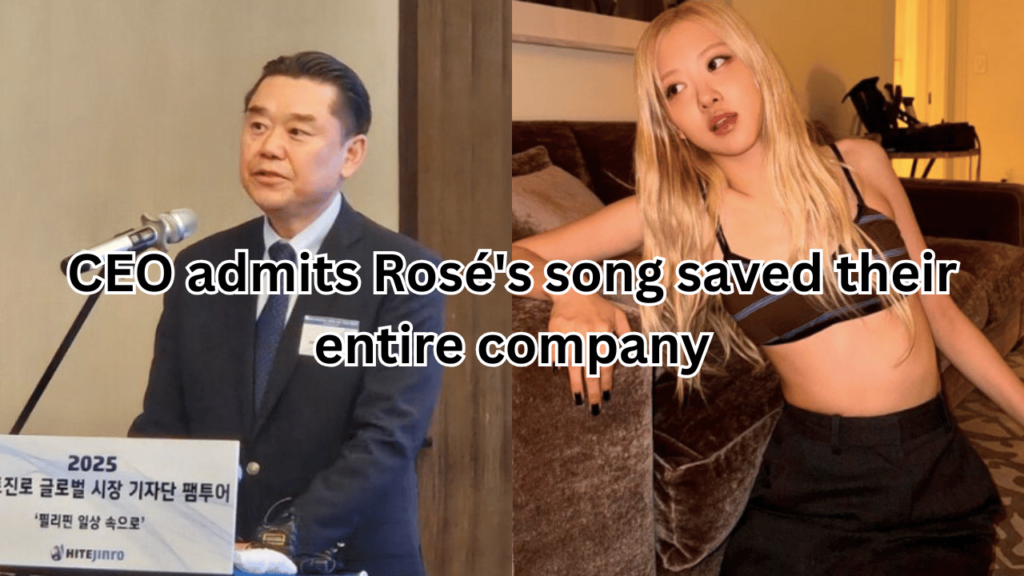BLACKPINK Rosé APT song has completely changed the game for Korean soju around the world. The catchy track featuring Bruno Mars didn’t just top music charts – it sparked a massive global interest in Korean drinking culture. Now, soju companies are seeing incredible results they never expected from a pop song.
Kim In-gyu, the CEO of Hite Jinro, recently spoke about how BLACKPINK Rosé APT transformed their business. During a press conference in late May, he couldn’t hide his excitement about the song’s impact. The track brought Korean nightlife and drinking traditions into the spotlight like never before. Young people everywhere started learning about soju through Rosé’s music and promotional videos.
How BLACKPINK Rosé APT Created a Soju Revolution
The BLACKPINK Rosé APT phenomenon began when the song was released in October 2024. But it wasn’t just the music that caught people’s attention. Rosé appeared in a Vogue video where she demonstrated how to make somaek – a popular Korean drink mixing soju and beer. This simple tutorial video went viral and got millions of views within days.
Suddenly, fans around the world wanted to try Korean drinking culture for themselves. The Jinro stock boost Rosé created was immediate and impressive.
HiteJinro’s stock price jumped 6% to 21,200 won, marking the biggest gain since February. Trading volume exploded to over one million shares – eight times higher than usual.
The apartment game featured in the song also became a global trend. This traditional Korean drinking game involves stacking hands and removing them one by one. When someone’s hand lands on the called number, they have to drink. Rosé’s authentic presentation of Korean culture made it feel accessible and fun to international audiences.
Jinro Stock Boost Rosé Effect Spreads Across Asia
CEO Kim In-gyu explained how the BLACKPINK Rosé APT success opened doors in Southeast Asia. The Philippines became their model market, where Jinro now holds an impressive 67% market share. This success story is directly linked to the Korean Wave and pop culture influence that Rosé represents.
The company isn’t stopping there. They’re planning to expand throughout Southeast Asia using the momentum from Rosé’s cultural impact. The Jinro stock boost Rosé created showed investors that K-pop collaborations can drive real business results.
Other Korean liquor companies are now watching closely and developing their own pop culture marketing strategies.
Social media played a huge role in spreading the soju trend. Fans started posting their own somaek-making videos and apartment game sessions. The hashtags related to the song and Korean drinking culture trended worldwide. This organic spread of content created authentic interest that traditional advertising could never achieve.
See Also: ITZY Defines Girls in New Girls Will Be Girls Album Teasers
Korean Culture Goes Global Through BLACKPINK Rosé APT
The BLACKPINK Rosé APT impact goes beyond just selling more soju bottles. It represents how K-pop stars can serve as cultural ambassadors for their country. Rosé didn’t just promote a product – she shared genuine Korean experiences with her global fanbase.
CEO Kim emphasized that they want Jinro to become more than just an alcoholic beverage. Their vision positions soju as a lifestyle product that connects people to Korean culture.
The Jinro stock boost Rosé generated proved that this strategy works with younger, international consumers.
The success also revived interest in older Korean songs. Yoon Soo-il’s 1982 hit “Apartment” saw a 190% increase in streaming after Rosé’s version was released. This shows how modern K-pop can breathe new life into classic Korean entertainment.
Final Thoughts: BLACKPINK Rosé APT Changes Everything for Korean Brands
The BLACKPINK Rosé APT phenomenon proves that authentic cultural exchange through music can create incredible business opportunities. When artists share their genuine experiences and traditions, global audiences respond with enthusiasm and curiosity. The Jinro stock boost Rosé created is just the beginning of what’s possible when K-pop meets traditional Korean culture.
What do you think about how K-pop stars can influence global business trends through their authentic cultural sharing?






